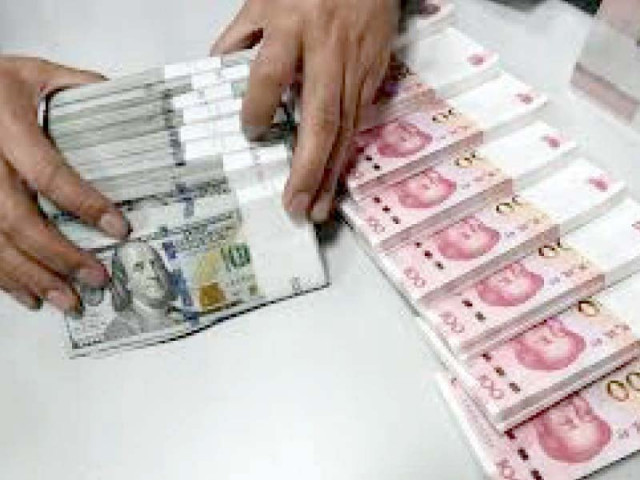Pakistan to seek $2b in new loans
Fresh borrowing to be made for activities like garbage collection, pension, fiscal reforms

Pakistan also wants to take $300 million in loan from the ADB in the name of “financial markets development programme”. PHOTO: FILE
The loans that Pakistan wants to obtain from the World Bank and the Asian Development Bank (ADB) are higher than the $1.8-billion debt relief that Islamabad has sought from G20 nations.
The Ministry of Finance presented over half a dozen concept clearance papers for approval by the Central Development Working Party (CDWP) that met on Tuesday under the chairmanship of Planning Commission Deputy Chairman Jehanzeb Khan.
The CDWP meeting continued for the whole day and it approved some other projects. The concept clearance papers would be considered for approval on Wednesday when the CDWP meets again.
Once the CDWP clears concept papers of these loans, the board of directors of the World Bank and ADB would approve the loans.
The activities that the Ministry of Finance has listed to obtain loans do not require any foreign financing. All it needs is the political will to introduce these reforms.
All the concept papers lacked “situation analysis and need assessment”, according to the documents. The finance ministry has not justified the reasons for acquiring the additional debt amid Moody’s - the global credit rating agency -warning that Pakistan may default on its private debt payments.
Pakistan’s public debt is projected to increase to Rs37.5 trillion or a whopping 90% of gross domestic product (GDP) by June this year. The country will this year spend Rs2.8 trillion or 72% of the estimated Federal Board of Revenue (FBR) tax collection on public debt servicing alone.
When the Pakistan Tehreek-e-Insaf (PTI) government came to power almost two years ago, the public debt stood at Rs24.8 trillion that since then has been rapidly growing.
Prime Minister Imran Khan was once very vocal against seeking foreign loans. But his government is also continuing the policies followed by his arch political rival - the Pakistan Muslim League-Nawaz (PML-N).
“Seven concept clearance projects were presented in the meeting,” said a statement issued by the Ministry of Planning and Development, after the CDWP meeting.
The government of Punjab wants a loan of $100 million or Rs16 billion from the World Bank for “solid waste management efficiency programme”. The attitude of the government indicates that it does not care about the worsening debt indicators.
The Ministry of Finance also proposed $75 million in loan for pension reforms - an objective that needs the political will to announce that only those civil servants will get pension, who will contribute for it under the defined contribution scheme.
At present, pensions are funded from the budget and the government wants to introduce a contributory pension scheme.
Pakistan also wants to take $300 million in loan from the ADB in the name of “financial markets development programme”.
The money will be utilised by the finance ministry, State Bank of Pakistan (SBP), Securities and Exchange Commission of Pakistan and Federal Board of Revenue to “strengthen market stability, market facilitation, supply measures and demand measures”, according to the documents.
Another emergency loan of $500 million has been proposed to be obtained from the ADB for the Covid-19 Active Response and Expenditure Support Programme. The objective of this project is to buy “protective kits for medical staff and sex-disaggregated online database management systems and giving cash grants”.
However, the planning ministry is of the view that the project caters only to the needs of Islamabad and also there has been no firm commitment from the ADB to provide the loan.
Similarly, the government has planned to take two budget support loans worth $1 billion from the World Bank for fiscal management and improving regulatory frameworks.
Over the past almost 10 years, the budget support loans have become favourite tools of all political governments to build foreign exchange reserves.
Dr Reza Baqir-led SBP has now added a new dimension - the hot foreign money - to build foreign exchange reserves. This policy caused more damage as the central bank had to keep the interest rate artificially high.
During its first day of proceedings, the CDWP approved six projects worth Rs16.1 billion and recommended one project worth Rs25.2 billion to the Executive Committee of National Economic Council (Ecnec) for approval.
The CDWP recommended the PhD Scholarship scheme under the US-Pakistan Knowledge Corridor programme worth Rs25.2 billion to Ecnec. This programme will be developed in collaboration with renowned US institutions for transferring new research techniques focused on Pakistani needs.
The CDWP approved the Balochistan Human Capital Investment Project at a cost of Rs5.6 billion. It also approved the Jalozai Campus of UET Peshawar at a cost of Rs6.5 billion.
Published in The Express Tribune, May 20th, 2020.
Like Business on Facebook, follow @TribuneBiz on Twitter to stay informed and join in the conversation.


















COMMENTS
Comments are moderated and generally will be posted if they are on-topic and not abusive.
For more information, please see our Comments FAQ